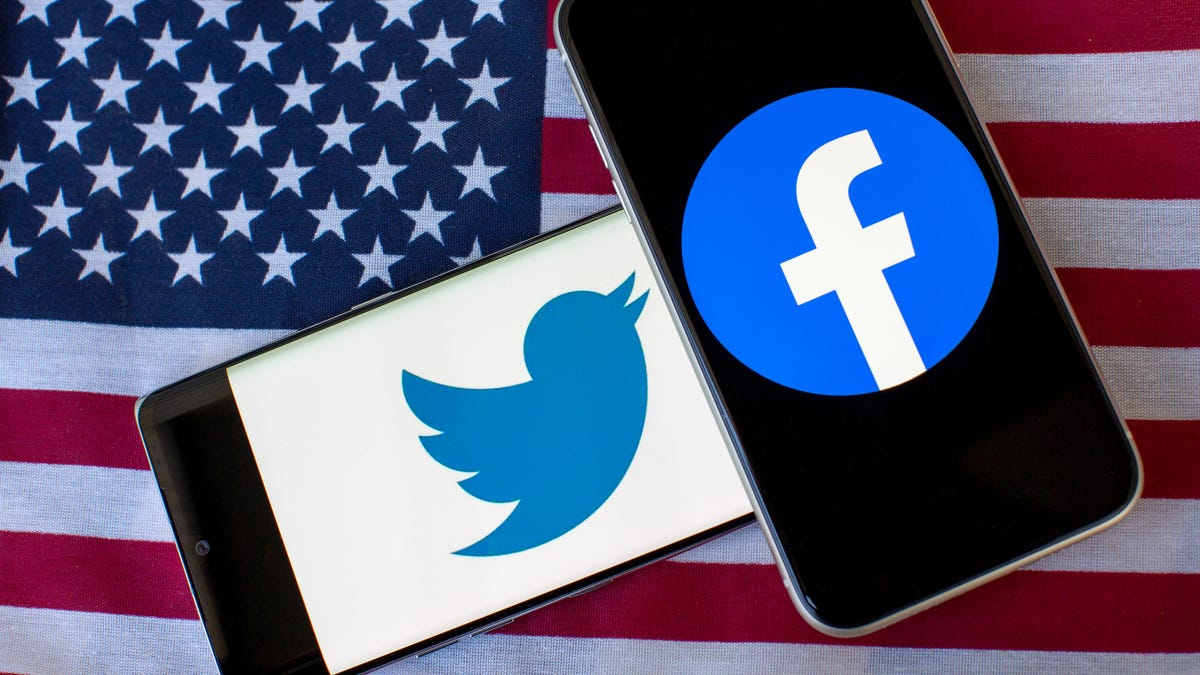Georgia Senate runoffs are another big test for Facebook, Twitter
Election misinformation continues to spread on social media after two Senate runoffs on Jan. 5.

Facebook and Twitter have been under more pressure to combat election misinformation.
Facebook and Twitter continue to battle another wave of election misinformation on Wednesday after Georgia voters headed to the polls a day earlier to cast their votes in two runoffs that will determine whether Democrats or Republicans control the US Senate.
The races are pivotal because the outcome will affect President-elect Joe Biden's legislative agenda, which includes efforts around the coronavirus pandemic, economic relief, climate change and racial equity. More than 4 million votes were cast in Tuesday's runoffs with most of the total coming from early voting or absentee ballots. Democratic challenger Rev. Raphael Warnock defeated Republican Sen. Kelly Loeffler. The other Democrat, documentary filmmaker Jon Ossoff, has a narrow lead over Republican incumbent David Perdue. A runoff election occurs when a candidate falls short of the majority of votes needed to win.
With the stakes high, social networks have been trying to show yet again they're doing a better job at combating political misinformation. Researchers, though, have been pointing out that some of their efforts have fallen short. There are also still questions about whether tactics such as labeling social media misinformation works.
Meanwhile, social media users including high-profile politicians are still spreading online lies. On Wednesday, President Donald Trump continued to push false claims about election fraud. Twitter added labels under several of Trump's tweets, noting his claims about election fraud were disputed. Trump posts were also labeled on Facebook. The social network's labels mentioned there was no evidence of widespread election fraud.
Twitter said it would also label false or premature claims about results and its rules against interfering in the election.
"As we did throughout the 2020 US [presidential] election, our teams are working in partnership with election officials and taking strong action to protect the online, public conversation happening around the Georgia runoff election," a Twitter spokesperson said in a statement.
On Wednesday, Ossoff also claimed victory over Perdue before multiple news outlets called the race. Twitter added a label to Ossoff's tweet claiming victory, noting that "multiple sources may not have called the race when this was tweeted." The tweet contained a video in which Ossoff said "It is with humility that I thank the people of Georgia for electing me to serve you in the United States Senate." The same video was shared on Ossoff's Facebook Page. Facebook added a label directing users to its election information center.
Inn addition, Facebook partners with third-party fact-checkers that debunk false claims. The company, though, exempts politicians from fact-checking, arguing that political speech is already heavily scrutinized.
Facebook and political ads
Facebook has a public database displaying ads running on the social network. It had paused political ads but lifted the ban in December for the Georgia runoffs. Facebook and Twitter both faced criticism, including from the Democratic Senatorial Campaign Committee, that a political ads ban would harm efforts to inform Georgia voters about the Jan. 5 runoffs. Twitter kept its political ads ban in place.
The decision by Facebook to allow Georgia runoff ads also came with a tradeoff. This week, Avaaz, a global activist group, said it found 104 Republican Facebook ads between Dec. 23 and 29 that appeared to violate the social network's rules against sensationalist content and discriminatory practices. Roughly 47 of 95 ads containing fact-checked political disinformation came from politicians. As of Tuesday morning, Avaaz said Facebook removed 18 of the ads the group flagged. Most of the removed ads contained false claims from the Senate Leadership Fund that Ossoff wants to defund the police, allegations the politician has denied and fact-checkers have debunked.
"Plain and simple, Facebook is not protecting Georgia voters from political disinformation. Facebook opened the floodgates for false and misleading information targeting Georgia voters when it lifted the ban on new political ads last month," said Nathan Miller, Avaaz's campaign director, in a statement.
In December, Avaaz also found evidence Facebook's labeling of posts with false election information about the Georgia runoffs has been inconsistent.
Facebook didn't respond to a request for comment. Company spokesperson Andy Stone told The Washington Post that claims from Republican campaigns were also made in direct mail along with radio and TV appearances. "The difference is Facebook's ad library is transparent, making the claims more readily available for scrutiny," he said.
Facebook said it would no longer allow ads about the Georgia runoffs starting on Wednesday. The company didn't say when it plans to lift its broader ban on political ads.
On Tuesday, The Markup reported after Facebook reversed its political ads ban that some Georgia users started seeing more partisan content on their news feed. The nonprofit paid 58 Facebook users to allow the organization to monitor their Facebook news feeds. Stone said on Twitter The Markup drew "pretty strong conclusions" based on a small sample of users.
Facebook this week also removed an ad from The Lincoln Project, an anti-Trump PAC, that encouraged Republicans not to vote.

